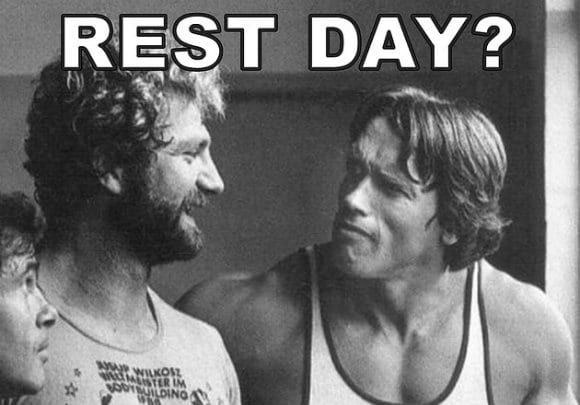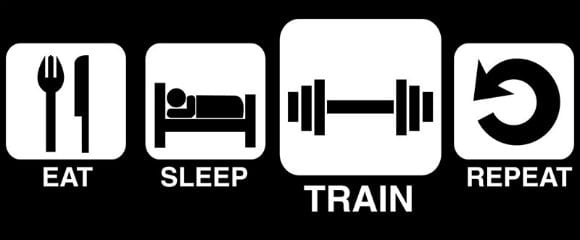By healthiergang writer Domenico Capodiferro, physician specializing in Sports Medicine.
Gym Every Day
In the first part of this article we analyzed the historical roots and some of the aspects related to the diatribe between high frequency (and high volume) and low frequency (and low volume) training.
What is the Best Approach? Because?
Let me begin the discussion with an ambitious, almost Darwinian concept, namely the "natural selection of the gymnast": out of a random sample of people who approach weight / strength training for the first time, about 50% will give up. within the first year; then there is 45% of subjects who will continue to train, perhaps for several years, but most of the time in an inconsistent manner, with fluctuating commitment and lack of motivation; the remaining 5% is made up of the hard core, a small elite of subjects that I like to define affectionately (and self-deprecatingly) "gymnasiums".

If you are reading this article, it is very likely that you too, like me, are part of this 5% or aspire to be part of it. We love training so much that while the remaining 95% of gym-goers struggle to find the motivation to do half an hour of cardio 3 times a week, we gyms have to almost self-fix days.
The Reason for This Almost Obsessive Passion?
Let's admit it serenely: training, especially when a sufficient neuro-muscular connection and relatively high performance levels are reached, produces psycho-physical effects that involve addiction phenomena comparable to those of a substance of abuse (just think of the release of endorphins after training; or to the wonderful sensation given by the muscle "pumping", which Arnold Schwarzenegger defined similar to the pleasure of orgasm).
It is therefore not surprising that many gyms are inexorably drawn to the weight room and train on average 5-6 times a week (sometimes even 7 days a week, for several months without a day off), often for several hours a day.
Unfortunately, this strategy, especially in the long run, is destined to become physiologically unsustainable and counterproductive.

In fact, beyond a certain threshold, which varies from individual to individual, we run into the problem of overtraining, better known with the English expression "overtraining", that is, our body is depleted of the metabolic resources necessary to repair muscle micro-injuries induced by training and / or the neuro-psychic energies and / or does not have the material time to complete these processes and restore these stocks; furthermore, hormonal homeostasis is greatly altered.
Even if the scientific community is not yet in agreement in recognizing overtraining as a well-defined clinical entity, especially because it is difficult to measure and objectify, most experts in the training sector believe it is established that an excessive training volume, for a repeated period, it leads to a significant decline in athletic and neuro-psychological performance (in a nutshell: overtraining exists!).
There are no alternatives: to avoid the bugbear of overtraining you have to rest!
Exceptions to the rule
Now, I can be countered with numerous examples of top-level athletes who train every day or almost, in a grueling way, and are able to achieve and maintain exceptional performances. True, these individuals exist, but I am able to list at least three main reasons why their situation is special and not comparable to the vast majority of us.
1. Genetics
Only a small minority of "fortunelli" have a genetic heritage that gives them an exceptional response to training both in terms of results and recovery capacity.
2. Professionalism
Many of the Olympic-level athletes (just think of gymnasts or swimmers, which, in the collective imagination, are two categories subjected to very high workloads) are professionals, i.e. the discipline they practice and train for is their only one. employment, while we recreational athletes have to balance the stress induced by work or study with that induced by training.
3. Doping
This last point is a bit of a taboo, but it cannot be overlooked, because one of the main characteristics of performance enhancing drugs (testosterone and derived substances, in particular) is to greatly facilitate recovery, channeling nutrients. towards muscle cells and stimulating protein synthesis and therefore the reworking of contractile proteins.
Notoriously, a large chunk of high-level bodybuilders and an unspecified percentage of professional athletes from almost any sport (it is likely that the scandals involving cycling and athletics in recent years are just the tip of the iceberg) make use of these. substances, without which the long and exhausting workouts they undergo would be substantially impossible.
Most of us are not part of any of the 3 categories just mentioned, so (unfortunately) it would be better for us to resist the temptation to overdo it, to train every day until we are exhausted, because, as a famous American proverb says: " sometimes you have to take a step back, to take two steps forward! ”.
My dispassionate advice is to go to the gym a maximum of 5 times a week, or provide at least 2 days of rest (rest does not necessarily mean spending the day in a coma on the sofa in front of the TV; light physical activities, such as walking or doing chores together with friends or loved ones, are highly recommended for a good psycho-physical recovery, even more than absolute rest).
Although I believe that the best results are obtained by alternating a day of training and a day of rest, (if we really can't stay that far away from the gym) it is quite tolerable a routine that includes two days of training followed by one of rest, for example. example:
- Monday and Tuesday: training
- Wednesday: rest
- Thursday and Friday: training
- Saturday: rest
- Sunday and Monday: training
- Tuesday: rest
- … and so on ….
Recovery = Rest + Nutrition
It is good to keep in mind that the other fundamental component of recovery, besides rest, is nutrition. Without good nutrition, even if the rest were adequate, we would still get mediocre results.
The nutrition chapter deserves a separate discussion, so in this article I will limit myself to emphasizing its importance, in particular with regard to peri-workout nutrition (i.e. the meals immediately before and after and any supplements taken during the workout itself ), which I mentioned in the previous article.
The Notorious "Eat, Sleep, Train" Triad
We talked about sleep (to rest), our beloved train (to train) and alluded to eat (to eat).

This mantra is perhaps a bit simplistic, but ultimately sums up beautifully what it takes to get good results from weight / strength training:
1. eat (pay close attention to both the quantity and quality of nutrients!);
2. rest (I know, this is the most boring part, but alas it is necessary otherwise you risk frustrating everything);
3. train (the most engaging part, sometimes too much .... Always remember that to optimize muscle growth, training must act as a stimulus, it must not be a massacre for our neuro-muscular system. Therefore, as a warning, I quote a famous phrase from Mr Olympia's 8-title winner Lee Haney: “stimulate, do not annhilate!” or “stimulate, don't annihilate!”).
... finally, to respond concisely to the questions we asked ourselves at the beginning of the article ...
Train Every Day
It's possible? Yes, it would be. A pinch of initial motivation is all it takes ... as time goes by, it is likely that the workout will be so enjoyable that the situation will turn around and it will be almost more difficult to take a day off than to go to the gym.
It is necessary? Absolutely not.
Is it profitable? Basically no, for the vast majority of us it would be better to adopt a routine that includes 2-3 days of rest per week.


























